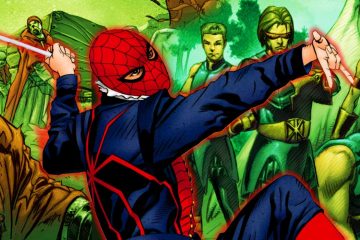Since his first comic appearance in 1962, the ever-mercurial Loki has been many things. The character drifts between supervillain, antihero, and even out-and-out superhero. Readers have witnessed Loki as an ominous, Machiavellian adult in Dark Avengers and a playful, virtuous child in Young Avengers. Given his bisexuality and gender fluidity, neither his romantic partners nor sex can be predicted from panel to panel. This has always been the character’s principal appeal — a capricious refusal to be definitively labeled that keeps fans forever on their toes. Loki’s variability means even long-term readers of Marvel never know quite what to expect from the God of Mischief.Never was this more apparent than in 2016’s Vote Loki by Christopher Hastings, Langdon Foss, and Paul McCaffrey. Just three years before, Loki had been at his most sinister, manipulating the master manipulator himself, Norman Osborn, during the run-up to Siege. Subsequently killed, resurrected, and partially redeemed during Secret Wars (2015), Hastings took Loki in the most left-field direction yet: what if the God of Mischief were to run for president? Timed to coincide with America’s divisive 2016 general election campaign, Vote Loki is a lively and fun slice of political satire as relevant today as when it was first published.Though knowingly offbeat, in many ways, Vote Loki makes perfect sense. After all, the God of Mischief perfectly aligns with today’s populist politicians — charismatic, a flagrant liar, and more than capable of stirring debate between his advocates and detractors alike. Many view the political landscape as littered with power-hungry glory seekers who strain to be perceived as anything but. Part of what makes Vote Loki such an amusing read is the manner in which the God of Mischief does nothing to conceal his hubristic megalomania. When Loki’s campaign begins to take off, Nisa Contreras — Vote Loki’s protagonist — seeks to derail his presidential chances by exposing a Loki-supporting political action committee as a disturbing occult sect. Loki responds by calling a press conference. “Yes, of course I have followers. Worshipers. A religion,” he declares. “I thought I made that very clear. I am a god.”RELATED: Loki’s Treatment of Different Timelines Puts the Multiverse Saga on the Right PathRELATED: Thor and Loki Are Sure to Reunite in the MCU – But Maybe They Shouldn’t
Since his first comic appearance in 1962, the ever-mercurial Loki has been many things. The character drifts between supervillain, antihero, and even out-and-out superhero. Readers have witnessed Loki as an ominous, Machiavellian adult in Dark Avengers and a playful, virtuous child in Young Avengers. Given his bisexuality and gender fluidity, neither his romantic partners nor sex can be predicted from panel to panel. This has always been the character’s principal appeal — a capricious refusal to be definitively labeled that keeps fans forever on their toes. Loki’s variability means even long-term readers of Marvel never know quite what to expect from the God of Mischief.
Never was this more apparent than in 2016’s Vote Loki by Christopher Hastings, Langdon Foss, and Paul McCaffrey. Just three years before, Loki had been at his most sinister, manipulating the master manipulator himself, Norman Osborn, during the run-up to Siege. Subsequently killed, resurrected, and partially redeemed during Secret Wars (2015), Hastings took Loki in the most left-field direction yet: what if the God of Mischief were to run for president? Timed to coincide with America’s divisive 2016 general election campaign, Vote Loki is a lively and fun slice of political satire as relevant today as when it was first published.
Though knowingly offbeat, in many ways, Vote Loki makes perfect sense. After all, the God of Mischief perfectly aligns with today’s populist politicians — charismatic, a flagrant liar, and more than capable of stirring debate between his advocates and detractors alike. Many view the political landscape as littered with power-hungry glory seekers who strain to be perceived as anything but. Part of what makes Vote Loki such an amusing read is the manner in which the God of Mischief does nothing to conceal his hubristic megalomania. When Loki’s campaign begins to take off, Nisa Contreras — Vote Loki’s protagonist — seeks to derail his presidential chances by exposing a Loki-supporting political action committee as a disturbing occult sect. Loki responds by calling a press conference. “Yes, of course I have followers. Worshipers. A religion,” he declares. “I thought I made that very clear. I am a god.”
#Vote #Loki #God #Mischiefs #Comic
Note:- (Not all news on the site expresses the point of view of the site, but we transmit this news automatically and translate it through programmatic technology on the site and not from a human editor. The content is auto-generated from a syndicated feed.))



